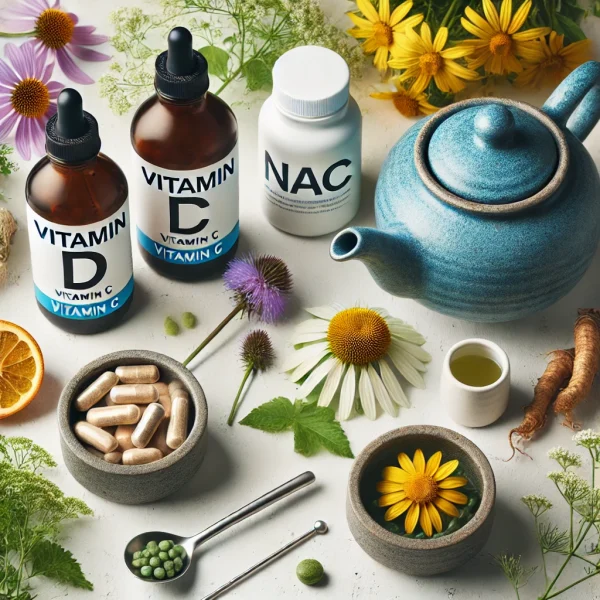
Outside of taking antibiotics for an infection or Tylenol for a fever, most people don't have many alternatives for boosting their immune systems. However, many natural, immune-boosting supplements and lifestyle adjustments can significantly strengthen your defenses against illnesses.
A robust immune system helps you stay healthy even when exposed to viruses or bacteria. Integrating the right supplements with foundational lifestyle changes discussed in Part 1, Why You Keep Getting Sick, and What You Can Do about Those Flu Symptoms | Part 1 allows you to experience fewer sick days, better energy levels, and improved overall well-being.
This article highlights science-backed strategies to support your immune system, including new information on NAC and sinus flush techniques for enhancing respiratory health and reducing sinus infections.
Before diving into supplements, revisit Part 1 of this series for foundational advice on how diet, sleep, exercise, and stress management create the cornerstone of a strong immune system. Supplements work synergistically with these factors for optimal health.

Vitamin D is crucial for immune function. It boosts your body's natural production of cathelicidin, an antimicrobial peptide that helps the immune system fight infections.
Reference: Bikle DD. Vitamin D and immune function: understanding common pathways. Curr Osteoporos Rep. 2009.
NAC is a powerful antioxidant that replenishes glutathione, the body's master antioxidant. It plays a key role in respiratory health by breaking down mucus and supporting lung function.
Dosage: 600–1200 mg daily, especially during cold and flu seasons.
Reference: De Flora S, et al. Beneficial effects of NAC in reducing influenza symptoms. Eur Respir J. 1997.
Sinus infections and congestion are common during colds and flu. A saline sinus flush can reduce inflammation and clear nasal passages of irritants, allergens, and pathogens.
Benefits:
You can watch Dr. J's video on sinus flush here
Zinc supports over 100 enzymatic processes in the body, including developing and activating immune cells like T-cells.
Reference: Shankar AH, Prasad AS. Zinc and immune function: the biological basis of altered resistance to infection. Am J Clin Nutr. 1998.
Vitamin C enhances immune cell function and protects against oxidative stress. High doses can reduce the severity and duration of colds.
Reference: Hemilä H. Vitamin C and infections. Nutrients. 2017.
Colloidal silver acts as a natural antimicrobial agent against bacteria and viruses.
Reference: Lansdown AB. A review of colloidal silver's antimicrobial properties. J Wound Care. 2006.
Herbs like Echinacea, Andrographis, Astragalus, and Goldenseal enhance immune resistance by increasing the activity of white blood cells and natural killer cells.
Reference: Block KI, Mead MN. Immune system effects of echinacea, astragalus, and other botanicals. Integr Cancer Ther. 2003.
Reishi mushrooms contain polysaccharides and triterpenes that modulate the immune system and enhance the body's response to infections.
Reference: Gao Y, Zhou S, Jiang W. Reishi mushroom and immunomodulation. Int J Med Mushrooms. 2003.
Adaptogens like ashwagandha, Rhodiola, and licorice balance stress hormones and reduce cortisol levels, helping the immune system recover from chronic stress.
Reference: Panossian A, Wikman G. Effects of adaptogens on the central nervous and immune systems. Pharmaceuticals. 2010.
Coconut oil contains lauric acid, a natural antibacterial and antiviral compound.
Reference: Wang LL, et al. The role of lauric acid in viral infections. Front Immunol. 2020.
Combined with my first post's diet and lifestyle principles, I hope these recommendations help improve your chances of not getting sick this winter season.
Incorporate these daily practices to keep your immune system strong:
Use these intensive measures to combat illness quickly:
Your immune system is your body’s first line of defense, and with the right tools, you can significantly reduce your chances of falling ill and speed up recovery if sickness strikes. Incorporating preventative measures like adequate protein, vitamin D, and adaptogenic herbs into your daily routine strengthens your resilience against stress and seasonal challenges. For acute situations, swift action using immune-boosting supplements and supportive practices like Epsom salt baths and targeted herbal remedies can make all the difference.
Adopting these holistic strategies protects you from illness and improves your overall vitality and quality of life. The power to stay healthy lies in your hands!
If you're ready to take control of your immune health, explore our carefully curated selection of immune-supporting supplements in the Healthy Living Store. Start building a stronger, more resilient body today.
If you need personalized advice, click here. Schedule a consultation to create a tailored immune-boosting plan for your unique needs.
Let’s work together to keep you thriving all year long!